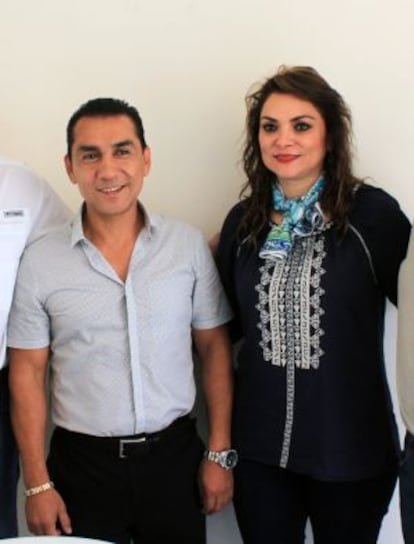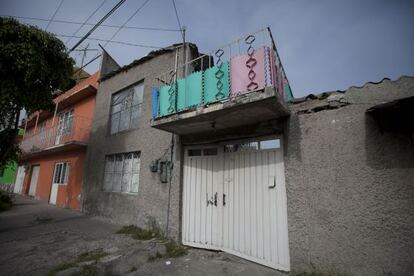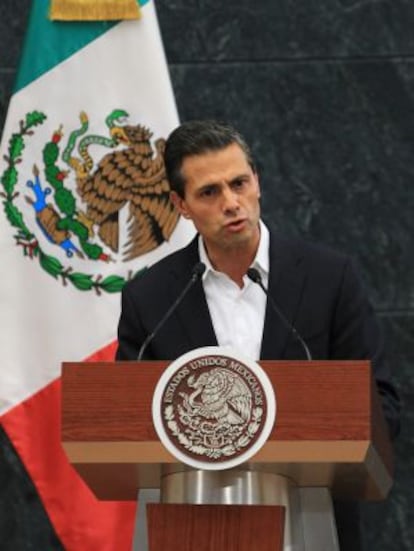Iguala mayor and his wife arrested in Mexico City over missing students
President Enrique Peña Nieto calls for a national pact against violence


The fugitive mayor of Iguala and his wife, considered the masterminds behind the disappearance of 43 students in late September, were arrested early Tuesday in Mexico City, officials said.
José Luis Abarca and María de los Ángeles Pineda, who fled Iguala three days after the students went missing following clashes with local police, were hiding inside a rental house in the neighborhood of Iztapalapa, in the Federal District.
Early reports said no shots were fired during the arrest, and that the couple had little more than a table and a bed inside their home.
The successful police operation comes as welcome news to the federal government, which has been laboring under growing criticism about the authorities’ incompetence in tackling the case.
Abarca and Pineda had been immediately suspected of ordering the abduction of the students, who were enrolled at a nearby teacher’s college renowned for its left-wing activism. A group of students had gone to Iguala to attend a street protest on the same day that Pineda was holding a political rally. The mayor is thought to have ordered the police to stop the youths in their tracks.
Several students were shot dead on the spot and one was brutally disfigured before 43 others were arrested by police, then allegedly handed over to local drug gang Guerreros Unidos, to which Pineda has family ties. Two hitmen for the gang have since admitted to shooting some of the students, and several mass graves were unearthed near Iguala, though no positive identification has yet emerged.
Now, investigators hope that the mayor and his wife – who was hoping to take over from her husband at municipal elections next year – will shed some light into the events of September 26, and above all, into the fate of the missing students from Ayotzinapa.
The mayor-and-wife team will also have to answer accusations of drug trafficking and other crimes. Abarca has been accused by a witness of personally assassinating a political rival, Unidad Popular leader Arturo Hernández Cardona, whose movement worked to defend rural workers’ rights.
Two of Pineda’s brothers worked for Arturo Beltrán Leyva, the former head of one of Mexico’s largest drug cartels, while her mother worked as a frontwoman for the Beltrán-Leyvas. Statements by Guerreros Unidos leader Sidronio Casarrubias Salgado, who was recently arrested himself, place Pineda at the center of the cartel’s activities in Iguala.
Mexican President Enrique Peña Nieto has taken this opportunity to try to regain control of the situation after weeks of growing unrest during which angry fellow students set fire to Guerrero state headquarters and promised escalating violence if the missing youths were not found. Meanwhile, universities across the country echoed their anger (as did some students at Harvard, MIT and Berkeley in the US), intellectuals raised their voices against the government’s inability to guarantee citizen safety, and even the Catholic Church weighed in against the executive.

“Guerrero is another lit match that Federation authorities refused to acknowledge, a reflection of the underlying danger of living in a country like Mexico, with serious internal problems of governability, security, corruption and fear in several regions where nobody is safe,” said representatives of the Archdiocese of Mexico City through the weekly Desde la fe.
Peña Nieto, of the Institutional Revolutionary Party (PRI), said he would call upon all political, state and social forces to join him in a great coalition against violence.
“It is essential to take institutional measures so that events such as these will not happen again, so we will join forces in favor of the rule of law and in the fight against corruption and impunity,” said the president.
Significantly, his announcement was made during the public presentation of the 25 regulations that will complete the government’s far-reaching energy reform, ending a 76-year-old state monopoly on oil. Peña Nieto is seeking to attract foreign investment to the country to restart the economy, and the image now being projected of a Mexico unable to deal with the Iguala crime arrives at a bad time, coming on top of falling crude prices.
His call for a national consensus was reminiscent of the Pact for Mexico, the cross-party alliance that enabled the deep structural reforms of the last two years.

The main opposition parties, the National Action Party (PAN) and the Democratic Revolutionary Party (PRD), have also felt the sting of criticism, and their leaders are publicly encouraging an alliance of this nature.
“The national situation in terms of security is so delicate, and the state of decomposition so advanced, that a great national long-term agreement is required to strengthen security and ensure the rule of law is effective,” said PAN president Ricardo Anaya.
“We are enormously concerned about the climate of violence […] we want the powers of the Union to be convened,” said PRD’s new leader Carlos Navarrete, whose party has been seriously harmed by having supported the mayor of Iguala despite years-long suspicions that he had ties to the drug rings.
Tu suscripción se está usando en otro dispositivo
¿Quieres añadir otro usuario a tu suscripción?
Si continúas leyendo en este dispositivo, no se podrá leer en el otro.
FlechaTu suscripción se está usando en otro dispositivo y solo puedes acceder a EL PAÍS desde un dispositivo a la vez.
Si quieres compartir tu cuenta, cambia tu suscripción a la modalidad Premium, así podrás añadir otro usuario. Cada uno accederá con su propia cuenta de email, lo que os permitirá personalizar vuestra experiencia en EL PAÍS.
¿Tienes una suscripción de empresa? Accede aquí para contratar más cuentas.
En el caso de no saber quién está usando tu cuenta, te recomendamos cambiar tu contraseña aquí.
Si decides continuar compartiendo tu cuenta, este mensaje se mostrará en tu dispositivo y en el de la otra persona que está usando tu cuenta de forma indefinida, afectando a tu experiencia de lectura. Puedes consultar aquí los términos y condiciones de la suscripción digital.








































